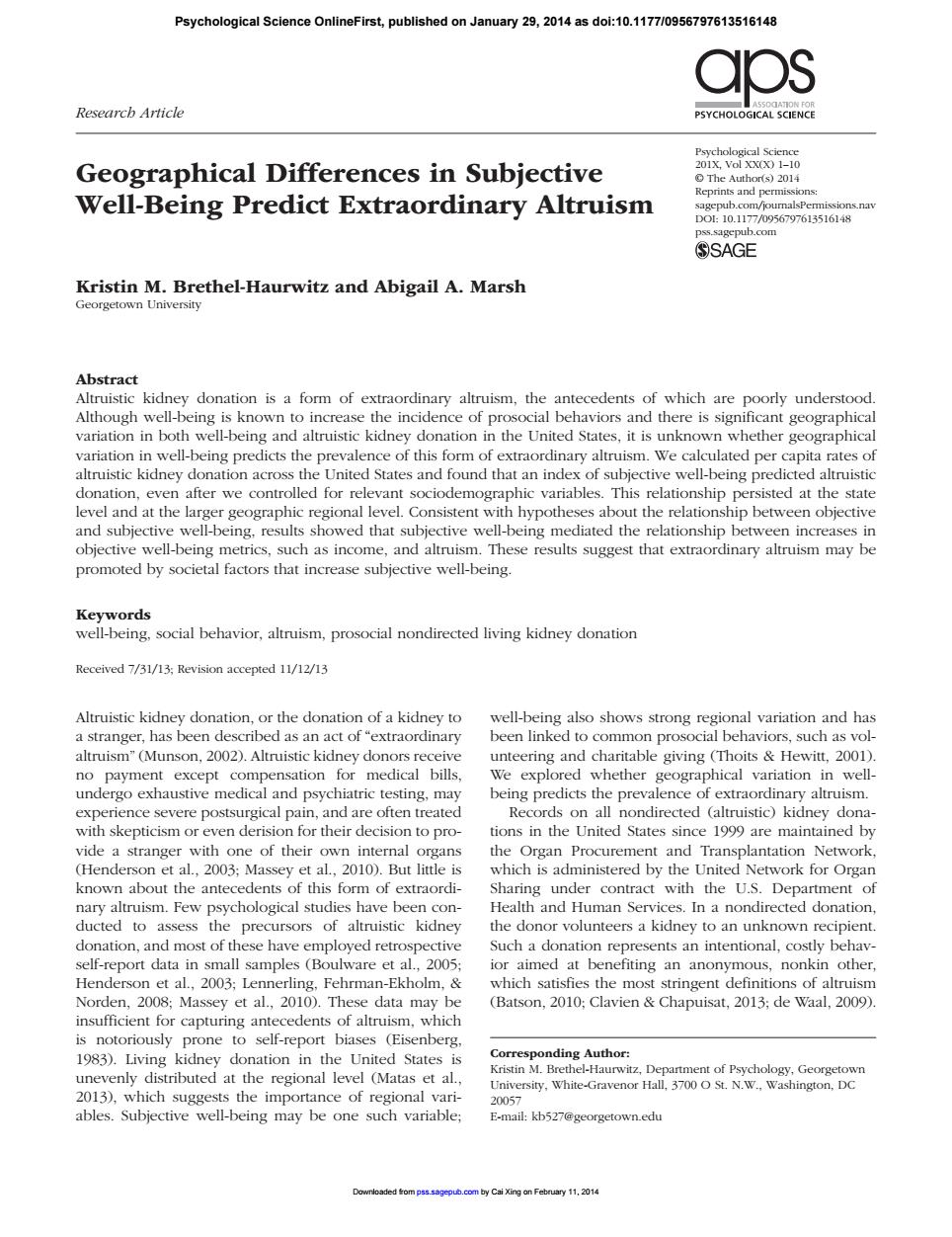正在加载图片...

Psychological Sclence OnlineFirst,published on January 29.2014 as dol:10.1177/0956797613516148 Research Article Geographical Differences in Subjective Well-Being Predict Extraordinary Altruism 0.1177 567976155161 o SAGE Kristin M.Brethel-Haurwitz and Abigail A.Marsh Georgetown University Abstract ny donaonoory the anecedents of whicn are poony under e is known ence of pro nere is sigr it is u nt geograph variation in well-being predicts the prevalence of this form of extraordinary altruism.We calculated per nita rates of altruistic kidney donation across the United States and found that an index of subjective well-being predicted altruistic donation,even after we controlled for relevant sociodemographic variables. This relationship persisted at the state level and at the la relations promoted by societal factors that increase subjective well-being. ocial behvior.mpoa ondretedvn kidney donaion Received 7/31/13:Rev accepted 11/12/13 Altruistic kidney donation.or the donation of a kidney to well-being also shows strong regional variation and has a stranger,has been described as an act of "extraordinary been linked to common prosocial behaviors,such as vol unteering and charitable giving (Thoits Hewitt,2001) no Paymen except compensa exp vanation in wel tions in the United States since 1999 are maintained by vide a stranger with one of their 03: sey et a 2010 red by th sychological studies have been con ducted to assess the precursors of altruistic kidney the donor volunteers a kidney to an unknown recipient donation.nd most of these have employed retrospective Such a donation represents an intentional,costly behav S (B at benefiting an anony nonkin othe Norden 2008:Massev et al 2010)Th data ma Bat on.2010:Clavien Chapuisat.201 de Waal.2009) insufficient for capturing antecedents of altruism,which prone to self-report biases (Eisenberg 1983).Living kidney nding Author: donation in nied States in M 2013. ables.Subjective well-being may be one such variable: .mail:kb527georgetown.edu 11.201 Psychological Science 201X, Vol XX(X) 1–10 © The Author(s) 2014 Reprints and permissions: sagepub.com/journalsPermissions.nav DOI: 10.1177/0956797613516148 pss.sagepub.com Research Article Altruistic kidney donation, or the donation of a kidney to a stranger, has been described as an act of “extraordinary altruism” (Munson, 2002). Altruistic kidney donors receive no payment except compensation for medical bills, undergo exhaustive medical and psychiatric testing, may experience severe postsurgical pain, and are often treated with skepticism or even derision for their decision to provide a stranger with one of their own internal organs (Henderson et al., 2003; Massey et al., 2010). But little is known about the antecedents of this form of extraordinary altruism. Few psychological studies have been conducted to assess the precursors of altruistic kidney donation, and most of these have employed retrospective self-report data in small samples (Boulware et al., 2005; Henderson et al., 2003; Lennerling, Fehrman-Ekholm, & Norden, 2008; Massey et al., 2010). These data may be insufficient for capturing antecedents of altruism, which is notoriously prone to self-report biases (Eisenberg, 1983). Living kidney donation in the United States is unevenly distributed at the regional level (Matas et al., 2013), which suggests the importance of regional variables. Subjective well-being may be one such variable; well-being also shows strong regional variation and has been linked to common prosocial behaviors, such as volunteering and charitable giving (Thoits & Hewitt, 2001). We explored whether geographical variation in wellbeing predicts the prevalence of extraordinary altruism. Records on all nondirected (altruistic) kidney donations in the United States since 1999 are maintained by the Organ Procurement and Transplantation Network, which is administered by the United Network for Organ Sharing under contract with the U.S. Department of Health and Human Services. In a nondirected donation, the donor volunteers a kidney to an unknown recipient. Such a donation represents an intentional, costly behavior aimed at benefiting an anonymous, nonkin other, which satisfies the most stringent definitions of altruism (Batson, 2010; Clavien & Chapuisat, 2013; de Waal, 2009). 516148PSSXXX10.1177/0956797613516148Brethel-Haurwitz, MarshWell-Being and Altruism research-article2014 Corresponding Author: Kristin M. Brethel-Haurwitz, Department of Psychology, Georgetown University, White-Gravenor Hall, 3700 O St. N.W., Washington, DC 20057 E-mail: kb527@georgetown.edu Geographical Differences in Subjective Well-Being Predict Extraordinary Altruism Kristin M. Brethel-Haurwitz and Abigail A. Marsh Georgetown University Abstract Altruistic kidney donation is a form of extraordinary altruism, the antecedents of which are poorly understood. Although well-being is known to increase the incidence of prosocial behaviors and there is significant geographical variation in both well-being and altruistic kidney donation in the United States, it is unknown whether geographical variation in well-being predicts the prevalence of this form of extraordinary altruism. We calculated per capita rates of altruistic kidney donation across the United States and found that an index of subjective well-being predicted altruistic donation, even after we controlled for relevant sociodemographic variables. This relationship persisted at the state level and at the larger geographic regional level. Consistent with hypotheses about the relationship between objective and subjective well-being, results showed that subjective well-being mediated the relationship between increases in objective well-being metrics, such as income, and altruism. These results suggest that extraordinary altruism may be promoted by societal factors that increase subjective well-being. Keywords well-being, social behavior, altruism, prosocial nondirected living kidney donation Received 7/31/13; Revision accepted 11/12/13 Psychological Science OnlineFirst, published on January 29, 2014 as doi:10.1177/0956797613516148 Downloaded from pss.sagepub.com by Cai Xing on February 11, 2014